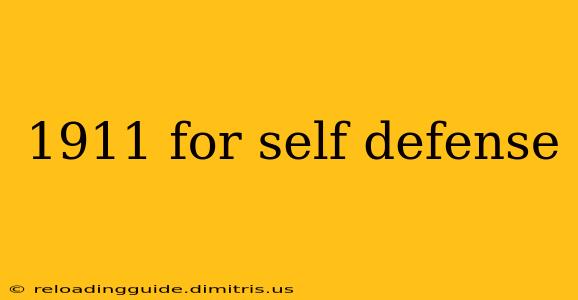The 1911 pistol, a legendary firearm with a century-long history, remains a popular choice for self-defense. Its robust design, powerful cartridge, and readily available aftermarket support contribute to its enduring appeal. However, choosing a 1911 for self-defense requires careful consideration of various factors. This guide explores the advantages and disadvantages, crucial considerations, and best practices for using a 1911 for personal protection.
Advantages of the 1911 for Self-Defense
-
Powerful Cartridge: The 1911 typically fires the .45 ACP cartridge, known for its stopping power. The larger projectile delivers significant energy transfer, increasing the likelihood of stopping a threat quickly. While other calibers are available (like 9mm and .38 Super), the .45 ACP remains synonymous with the 1911.
-
Reliable Design: The 1911's design, while relatively simple, has proven exceptionally reliable over time. Proper maintenance is key, but a well-maintained 1911 is a dependable firearm in stressful situations.
-
Accuracy: The 1911's single-action trigger, typically crisp and short, allows for precise shot placement. Accuracy is paramount in self-defense scenarios, minimizing collateral damage and maximizing effectiveness.
-
Customization: The vast aftermarket support for the 1911 offers unparalleled customization options. Grips, sights, triggers, and even internal parts are widely available, allowing shooters to tailor their pistol to their individual needs and preferences. This level of personalization enhances comfort and control.
-
Ergonomics (for some): Many find the 1911's grip angle comfortable and intuitive, facilitating a natural point of aim. However, this is subjective and depends on individual hand size and shooting style.
Disadvantages of the 1911 for Self-Defense
-
Size and Weight: The 1911 is a relatively larger and heavier pistol compared to modern polymer-framed handguns. This can make it less comfortable to carry concealed, particularly for individuals with smaller frames.
-
Capacity: Standard 1911s typically have a magazine capacity of 7 rounds (though extended magazines are available), which is lower than many modern handguns that offer 10, 15, or even more rounds.
-
Recoil: The .45 ACP cartridge produces significant recoil, especially in lighter-weight 1911s. This can affect accuracy and make rapid follow-up shots more challenging for some shooters. Proper grip technique and training are essential to manage recoil effectively.
-
Maintenance: While generally reliable, the 1911 requires more meticulous maintenance compared to some other pistols. Regular cleaning and lubrication are necessary to ensure its continued functionality.
-
Cost: High-quality 1911s can be significantly more expensive than other self-defense handguns.
Choosing a 1911 for Self-Defense: Key Considerations
-
Caliber: While .45 ACP is traditional, consider 9mm or .38 Super for reduced recoil and increased capacity.
-
Size and Weight: Choose a size and weight that you can comfortably carry and handle. Consider compact or commander-sized 1911s for concealed carry.
-
Reliability: Prioritize a reputable manufacturer known for producing reliable firearms.
-
Ergonomics: Try different 1911s to find one that fits your hand well.
-
Training: Regardless of the firearm chosen, comprehensive training is paramount. Professional instruction on safe handling, marksmanship, and defensive shooting techniques is crucial.
Conclusion: Is a 1911 Right for You?
The 1911 pistol offers a potent combination of power and accuracy, making it a compelling option for self-defense. However, its size, weight, capacity, and recoil characteristics should be carefully considered. Ultimately, the best self-defense handgun is the one you can shoot accurately and reliably under stress. Thorough research, professional guidance, and extensive training are essential before making a decision. Remember to always prioritize responsible gun ownership and adherence to all applicable laws and regulations.

